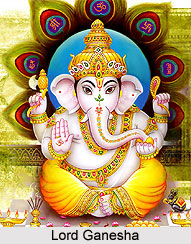 The Ganesha Dwaadasha Nama Shlokam is one of the mantras of Lord Ganesha that presents the 12 names or Forms of Lord Ganesha through devotional hymns. This holy mantra is recited daily by the devotees for the eradication of obstacles and other hindrances. Moreover the hymn also helps an individual to achieve success in important projects and ventures. Lord Ganesha is the son of Lord Shiva and Goddess Parvati and the elder brother Lord Kartikeya (Skanda). He is considered as the deity of good fortune, new ventures and wisdom and the Remover of Obstacles. He is also known as Lambodara, Vighneshvara, Surpakarna, Ganapati, Ekadanta and Gajanana, is regarded as the Lord of Beginnings and Success. It is believed that the hymns of the Ganesha Dwaadasha Nama Shlokam were composed by Sage Narada Muni.
The Ganesha Dwaadasha Nama Shlokam is one of the mantras of Lord Ganesha that presents the 12 names or Forms of Lord Ganesha through devotional hymns. This holy mantra is recited daily by the devotees for the eradication of obstacles and other hindrances. Moreover the hymn also helps an individual to achieve success in important projects and ventures. Lord Ganesha is the son of Lord Shiva and Goddess Parvati and the elder brother Lord Kartikeya (Skanda). He is considered as the deity of good fortune, new ventures and wisdom and the Remover of Obstacles. He is also known as Lambodara, Vighneshvara, Surpakarna, Ganapati, Ekadanta and Gajanana, is regarded as the Lord of Beginnings and Success. It is believed that the hymns of the Ganesha Dwaadasha Nama Shlokam were composed by Sage Narada Muni.
The verses of the Ganesha Dwaadasha Nama Shlokam are recited by the devotees of the lord. The stanzas of the devotional hymn describe the manners, activities and honorable traits of the 12 forms of Lord Ganesha. The stanzas represent one specific form of the deity. It is stated in the ancient Puranas that with the devotion (Shraddha) and faith (Bhava) of the worshipper, the benefit of the Ganesha Dwaadasha Nama Shlokam can be acquired. The holy Ganesha mantra includes all the 12 forms of the lord, namely Sumukha, Ekadanta, Kapila, Gajakarnaka, Lambodara, Vikata, Vighnanasa, Vinayaka, Dhumraketu, Ganadhyaksa, Bhalachandra and Gajanana in chronological order.
The Ganesha Dwaadasha Nama Shlokam is recited as follow-
Pranamya Shirasa Devam
Gauriputram Vinaayakam
Bhakataavaasam Smare Nityam
Aayush Kaamartha Siddhaye
Prathamam Vakratundam Cha
Ekadantam Dwiteeyakam
Thriteeyam Krishna Pingaaksham
Gajavaktram Chaturthakam
Lambodaram Panchamaam Cha
Shashtam Vikatameva Cha
Saptamam Vighnaraajendram
Dhoomravarnam Tathaashtamam
Navamam Phaalachandram Cha
Dasamam Tu Vinaayakam
Ekaadasam Ganapatim
Dvaadasam Tu Gajaananam
Dvaadasaitaani Naamaani
Trisandhyam Yah Pathernnarah
Na Cha Vighna Bhayam Tasya
Sarva Siddhikaram Prabho
Vidyarthi Labhate Vidyaam
Dhanaarthi Labhate Dhanam
Putrarthi Labhate Putraan
Mokshaarthi Labhate Gatim
Japet Ganapati Stotram
Shatbhir-masaihi Phalam Labeth
Samvatsarena Sidhim cha
Labhate Naatra Samshayaha
Ashtebhyo Brahmanebhyascha
Likhitva ya: Samarpayet
Tasya Vidya Bhavet sarvaa
Ganeshasya Prasadataha
Ithi Narada Purane Shri Ganesha Stotram Sampoornam
The devotional stanzas state that a devotee who recites the 12 names of Lord Ganesha for three times daily will achieve success in their tasks and all obstructions will be removed from their paths. Any individual who desires to achieve knowledge will obtain knowledge, a devotee who seeks to obtain wealth will achieve wealth and success, and any person who desires to attain salvation will achieve moksha by chanting the Ganesha Dwaadasha Nama Shlokam. The hymn also mentions that one who chants the Stotram of Lord Ganesha will achieve what he desires within a year. If a person gets the hymns written by 8 Brahmins with the blessing of Ganesha, he will be blessed with divine knowledge and the power of learning forever.









